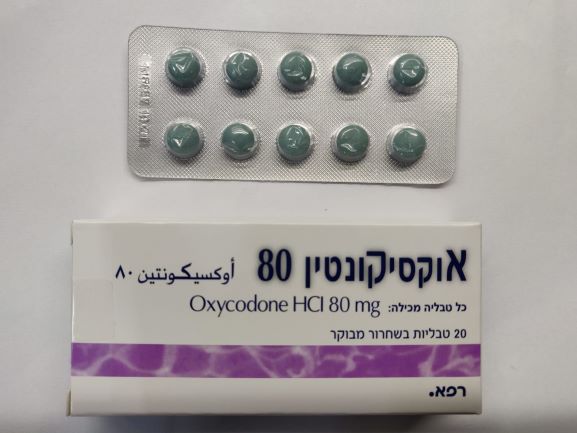Quest for the right Drug

אוקסיקונטין 80 OXYCONTIN 80 (OXYCODONE HYDROCHLORIDE)
תרופה במרשם
תרופה בסל
נרקוטיקה
ציטוטוקסיקה
צורת מתן:
פומי : PER OS
צורת מינון:
טבליות בשחרור מבוקר : TABLETS CONTROLLED RELEASE
עלון לרופא
מינוניםPosology התוויות
Indications תופעות לוואי
Adverse reactions התוויות נגד
Contraindications אינטראקציות
Interactions מינון יתר
Overdose הריון/הנקה
Pregnancy & Lactation אוכלוסיות מיוחדות
Special populations תכונות פרמקולוגיות
Pharmacological properties מידע רוקחי
Pharmaceutical particulars אזהרת שימוש
Special Warning עלון לרופא
Physicians Leaflet
Adverse reactions : תופעות לוואי
4.8 Undesirable effects Adverse drug reactions are typical of full opioid agonists. Tolerance and dependence may occur (see Section 4.4). Constipation may be prevented with an appropriate laxative. If nausea and vomiting are troublesome, oxycodone may be combined with an anti-emetic. The following frequency categories form the basis for classification of the undesirable effects: Term Frequency Very common ≥ 1/10 Common ≥ 1/100 to <1/10 Uncommon ≥ 1/1,000 to <1/100 Rare ≥1/10,000 to <1/1,000 Very rare <1/10,000 Frequency not known Cannot be estimated from the available data Immune system disorders: Uncommon: hypersensitivity. Frequency not known: anaphylactic reaction, anaphylactoid reaction. Metabolism and nutrition disorders: Common: decreased appetite. Uncommon: dehydration. Psychiatric disorders: Common: anxiety, confusional state, depression, insomnia, nervousness, abnormal thinking, abnormal dreams. Uncommon: agitation, affect lability, euphoric mood, hallucinations, decreased libido, disorientation, mood altered, restlessness, dysphoria. Frequency not known: aggression, drug dependence (see section 4.4). Nervous system disorders: Very common: somnolence, dizziness, headache. Common: tremor, lethargy, sedation. Uncommon: amnesia, convulsion, hypertonia, hypoaesthesia, involuntary muscle contractions, speech disorder, syncope, paraesthesia, dysgeusia, hypotonia. Frequency not known: hyperalgesia. Eye disorders: Uncommon: visual impairment, miosis. Ear and labyrinth disorders: Uncommon: vertigo. Cardiac disorders: Uncommon: palpitations (in the context of withdrawal syndrome), supraventricular tachycardia. Vascular disorders: Uncommon: vasodilatation, facial flushing. Rare: hypotension, orthostatic hypotension. Respiratory, thoracic and mediastinal disorders: Common: dyspnoea, bronchospasm, cough decreased. Uncommon: respiratory depression, hiccups. Not known: central sleep apnoea syndrome. Gastrointestinal disorders: Very common: constipation, nausea, vomiting. Common: abdominal pain, diarrhoea, dry mouth, dyspepsia. Uncommon: dysphagia, flatulence, eructation, ileus, gastritis. Frequency not known: dental caries. Hepato-biliary disorders: Uncommon: increased hepatic enzymes, biliary colic. Frequency not known: cholestasis, spasm of sphincter of oddi. Skin and subcutaneous tissue disorders: Very common: pruritus. Common: rash, hyperhidrosis. Uncommon: dry skin, exfoliative dermatitis. Rare: urticaria. Renal and urinary disorders: Uncommon: urinary retention, ureteral spasm. Reproductive system and breast disorders: Uncommon: erectile dysfunction, hypogonadism. Frequency not known: amenorrhoea. General disorders and administration site conditions: Common: asthenia, fatigue. Uncommon: malaise, oedema, peripheral oedema, thirst, pyrexia, chills. Frequency not known: drug withdrawal syndrome neonatal, opioid tolerance, opioid withdrawal syndrome. Opioid Tolerance and Opioid Withdrawal Syndrome The frequency of opioid tolerance and the frequency of opioid withdrawal syndrome cannot be estimated from available evidence (e.g. clinical trials, spontaneous reporting, and the medical literature) and therefore is classified as “not known” (see section 4.8). 'Not known' should not be interpreted as an indication of the rarity of the occurrence of opioid tolerance and opioid withdrawal syndrome, but a reflection of the limitations in the available evidence that do not support a precise estimate of frequency. Drug dependence The frequency above regarding drug dependence reflects the current evidence, including cumulative data from clinical trials and additional post marketing sources, and indicates that the risk of drug dependence with opioids is highly variable depending upon definition of drug dependence; duration of treatment; dose; individual patient risk factors; and clinical settings. 'Not known' should not be interpreted as an indication of the rarity of occurrence of drug dependence, but a reflection of the limitations in available evidence that do not support a precise estimate of frequency. Repeated use of OxyContin tablets may lead to drug dependence, even at therapeutic doses. The risk of drug dependence may vary depending on a patient's individual risk factors, dosage and duration of opioid treatment (see section 4.4 for monitoring and risk reduction interventions). OxyContin 10, 20, 40, 80: The following have also been reported, potentially due to the swelling and hydrogelling property of the tablet: choking, gagging, regurgitation, tablets stuck in the throat and difficulty swallowing the tablet. Reporting of suspected adverse reactions Reporting suspected adverse reactions after authorisation of the medicinal product is important. It allows continued monitoring of the benefit/risk balance of the medicinal product. Any suspected adverse events should be reported to the Ministry of Health according to the National Regulation by using an online form https://sideeffects.health.gov.il/

שימוש לפי פנקס קופ''ח כללית 1994
לא צוין
תאריך הכללה מקורי בסל
01/01/2000
הגבלות
תרופה מוגבלת לרישום ע'י רופא מומחה או הגבלה אחרת
מידע נוסף
עלון מידע לצרכן
14.02.13 - עלון לצרכן 06.08.15 - עלון לצרכן אנגלית 01.08.21 - עלון לצרכן אנגלית 01.08.21 - עלון לצרכן עברית 01.08.21 - עלון לצרכן ערבית 02.11.22 - עלון לצרכן עברית 11.05.23 - עלון לצרכן אנגלית 11.05.23 - עלון לצרכן עברית 11.05.23 - עלון לצרכן ערבית 01.08.23 - עלון לצרכן אנגלית 01.08.23 - עלון לצרכן עברית 01.08.23 - עלון לצרכן ערבית 03.06.24 - עלון לצרכן עברית 05.09.24 - עלון לצרכן עברית 05.03.19 - החמרה לעלון 12.04.21 - החמרה לעלון 27.05.13 - החמרה לעלון 02.11.22 - החמרה לעלון 05.12.22 - החמרה לעלון 07.09.23 - החמרה לעלון 06.06.24 - החמרה לעלון 05.09.24 - החמרה לעלוןלתרופה במאגר משרד הבריאות
אוקסיקונטין 80